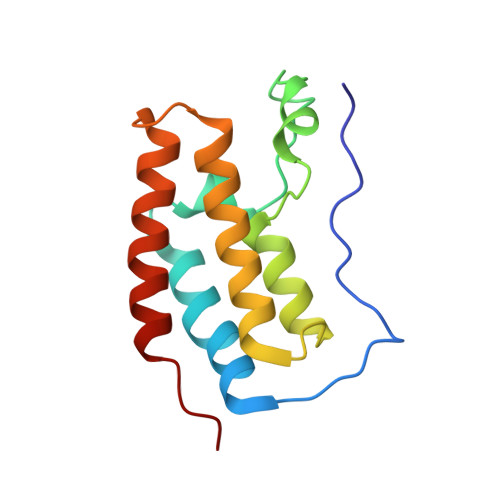Acetyl-lysine Binding Site of Bromodomain-Containing Protein 4 (BRD4) Interacts with Diverse Kinase Inhibitors.
Ember, S.W., Zhu, J.Y., Olesen, S.H., Martin, M.P., Becker, A., Berndt, N., Georg, G.I., Schonbrunn, E.(2014) ACS Chem Biol 9: 1160-1171
- PubMed: 24568369
- DOI: https://doi.org/10.1021/cb500072z
- Primary Citation of Related Structures:
4O70, 4O71, 4O72, 4O74, 4O75, 4O76, 4O77, 4O78, 4O7A, 4O7B, 4O7C, 4O7E, 4O7F, 4PS5 - PubMed Abstract:
Members of the bromodomain and extra terminal (BET) family of proteins are essential for the recognition of acetylated lysine (KAc) residues in histones and have emerged as promising drug targets in cancer, inflammation, and contraception research. In co-crystallization screening campaigns using the first bromodomain of BRD4 (BRD4-1) against kinase inhibitor libraries, we identified and characterized 14 kinase inhibitors (10 distinct chemical scaffolds) as ligands of the KAc binding site. Among these, the PLK1 inhibitor BI2536 and the JAK2 inhibitor TG101209 displayed strongest inhibitory potential against BRD4 (IC50=25 nM and 130 nM, respectively) and high selectivity for BET bromodomains. Comparative structural analysis revealed markedly different binding modes of kinase hinge-binding scaffolds in the KAc binding site, suggesting that BET proteins are potential off-targets of diverse kinase inhibitors. Combined, these findings provide a new structural framework for the rational design of next-generation BET-selective and dual-activity BET-kinase inhibitors.
Organizational Affiliation:
Drug Discovery Department and §Chemical Biology Core, H. Lee Moffitt Cancer Center and Research Institute , Tampa, Florida 33612, United States.

















